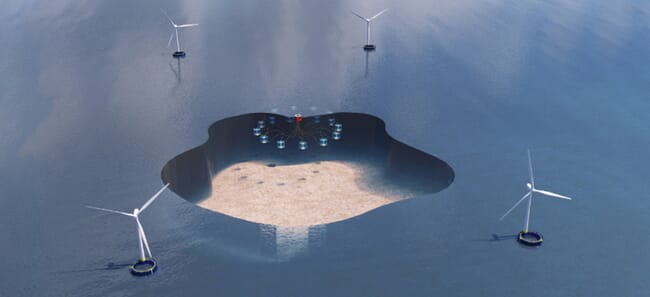
One of the project partners, Freja Offshore, is planning to build a floating wind farm, Mareld, which could also be a place for salmon farming as part of the OffWoff (Offshore Floating Wind and Offshore Fish Farms) co-location project.
Thordur Reynisson, advisor at Nordic Innovation, explains: “Our oceans are a fantastic source of life that we must utilise carefully. We want to support innovative projects that harness the potential of the sea while also strengthening and restoring marine biodiversity. We believe that Mareld could become such a project.”
Offshore wind farms can function as artificial reefs and marine protected areas. This increases the quantity of fish and shellfish, which in return will boost the availability of prey species. At the same time, larger fishing boats cannot pass through the wind farm. Instead, there are good opportunities for conducting fish farming.
The farms will be placed between the platforms of the wind turbines. Each system consists of 12 cages submerged in the sea and is estimated to produce around 6,000 tonnes of fish per year. The plan is to establish several systems in connection with the Mareld wind farm. Once the fish are harvested, they will be transported by ship to land for processing and packaging. Each system will require approximately 30 jobs at sea and 30 on land.
One advantage of farming fish in the open sea far from the coast is the lower presence of parasites that can attack the fish. Another benefit is that water quality is often better offshore. Subfarm's model, which uses submerged fish cages, protects the fish from sea lice and harmful algae.
Project partners:
- Subfarm is one of Norway's leading companies in offshore fish farming, with a strong focus on sustainability. The company develops fish cages designed to withstand the world's toughest conditions in the North Sea
- Lysekil Municipality is a hub for knowledge and development in the marine sector
- DHI is an international research institute with 60 years of experience studying aquatic environments in 140 countries. The institute is headquartered in Denmark
- Blue Maritime Cluster is a collaboration between 200 Norwegian actors in the marine sector and has been granted special expert status by the Norwegian government
- Freja Offshore AB is a joint venture between Norway's Mainstream Renewable Power and Sweden's Hexicon, established to develop, build, and operate floating offshore wind farms in Sweden
The project was kicked off 17 June 2024 with a meeting between the partners in Kristineberg.
